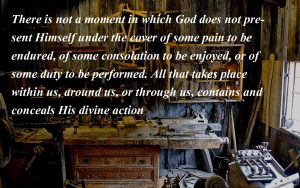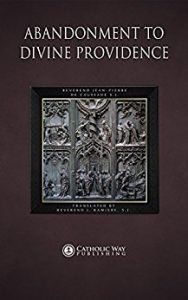The Sacrament of the Present Moment

Caussade sees the center of the Christian life as following God’s will which presents itself in every circumstance and moment.
I’m drawn to providence because I believe that we tend to discount the events and experiences in our lives, especially if we hate what is becoming of us or if life appears to be turning out badly. Providence teaches that God’s purposes are always operating to turn events toward the good. We see this principle at work for humanity as a whole. Countless surveys report that people feel the country is headed in the wrong direction. This pessimism is challenged by the idea of Providence, which trusts that the sweep of history presses relentlessly forward to bring about God’s ultimate intention. Even setbacks will ultimately serve a glorious end.
Abandonment to Divine Providence
I’m also trying to be as practical as possible in conformity with the general theme of all writings on this site. A truly Christian spirituality is one that, along with Jesus Christ, moves into the world rather than escapes from it. That’s why, as I was browsing for resources on providence, the title of the 17th century French priest, Jean Pierre de Caussade’s book, Abandonment to Divine Providence , grabbed my attention.

It turns out that this book is a Catholic devotional classic, appears in many editions, and is downloadable from Amazon for .99. Once I got the book, I realized that I already owned it. As it turns out de Caussades’ ideas under the title, Letters of Direction, was a gift to me from the parent of a high school friend around graduation time. That gift book was a slim and severely abridged version of the ebook, which I obtained on the cheap. Turns out that the abbreviated version was probably just fine.
The Book’s Back Story
There’s a pretty interesting back story about the authorship and editorial process. I think these kinds of mysteries cling to all writings that are more than a couple of hundred years old. You can read about these here. The 400+ page ebook consists or a treatise followed by dozens of letters of spiritual advice sent to the sisters in the Nuns of the Order of the Visitation of Holy Mary in Nancy, France.
So What Do We Learn from Father Jean Pierre de Caussade?
While all of background is interesting the important question is, “What is meant by ‘abandonment to divine providence?’” Here’s what I think: Caussade sees the center of the Christian life as following God’s will which presents itself in every circumstance and moment. It is as if God has expended years or eons of time, in the intricate management of events and the expenditure of energy to get me to the very moment that I find myself in NOW. Importantly, this now contains all the glory; all the education; all the direction I need in order to live a joyous and generous life. Even the most difficult circumstance that I find myself in contains for me the immense presence of God. If I learn to yield myself to this presence, or as he’d say “abandon” myself to it, then that yielding is all that is necessary for holy living.
An image that Caussades uses is that of the king in disguise. If the peasant is aware that it is the king who is present in disguise, the underling’s behavior is adjusted. Transferred to Caussades’ spirituality of the present moment, our recognition of the divine essence of our immediate circumstance has impact on our behavior.
I invented this image. Envision God taking you by hand into a workshop. The point of being guided into a workshop is so you may do some kind of work. The workshop itself reveals what it is you must doo. If it’s a woodworker’s shop with piles of dried boards, then woodworking is your calling. If you find yourself in a metal shop, then some kind of metal work. The workshop might be a kitchen. The point is that wherever God has guided you he has also provided all the tools and materials and instruction and inspiration for the work he wishes you to do with your life.

The Challenge of Christian Mysticism
I looked in vain through Caussades’ ocean of florid prose for a firm idea of what he means by providence. None was to be found, which is to say, “Reader: bring your own idea of what providence means to you.”
I also struggled to fit Caussades into the structure of my own Christian faith. Curiously, the book’s idea of this present moment, appears to me to be vested with the attributes of Jesus. It’s as if the reader is being called to drop nets and follow, not the savior from Galilee, but the saving circumstance, which the follower finds him or herself in. I could make the same point substituting the Holy Spirit, the Bible, the Eucharist or the Church. So, in pondering a second title that has been attached to Caussade’s book, The Sacrament of the Present Moment, it appears that NOW has, in Caussades’ hands, the status of a fourth member of the Trinity.
It’s telling that Caussades’ writings remained hidden away for a long period of time. When it came time for publication, one editor felt compelled to state in the Preface that there is no salvation apart from Jesus Christ. To put it baldly, Abandonment to Divine Providence skirts along the edges of heresy, or perhaps more kindly, of heterodoxy. I’m agreeing that readers need to bear this fact and many more in mind as the pick through Caussades’ ideas.
Abandonment to Divine Providence is an example of Christian mysticism. Mysticism is commonplace not only in all religious traditions but in meditative practices and other endeavors as well. It is simply the cultivation of practices, which seek union with God or the absolute obtained through contemplation, self-surrender, and other practices. The problem with mysticism from a Christian point of view is that it need not rely nor assume essential features of Christianity–the scriptures, church, Jesus Christ and so on.
That said, right-believing conventional Christians may find that their faith or church-based piety is emotionally arid and lacking in kindling spiritual power. Virtually, every serious Christian I’ve known has reached a sense of the bleakness of conventional church-going and become interested in, well, Christian mysticism. This happened with me when I discovered Richard Forster’s book, Celebration of Discipline, back in the 1980’s.
Caussades’ writings open doors for me on how a robust consciousness of God’s Providence changes the way I look at the world and whatever personal drama I’m struggling through right now.
Interesting–providential– that this book was placed in my hands when I was 17.


2 Replies to “The Sacrament of the Present Moment”
Good review of Caussades work and his concept. While I do not totally disagree with Caussade, my perspective- right or wrong – feels different. I would probably be a bit uncomfortable with his approach to mysticism. I think I feel more comfortable with Jesus’ command to “Follow Me”, regardless of the presence of a saving circumstance. In fact I would think any saving circumstance would flow from the Holy Spirit at work with Jesus. “Follow me” works and seems to always work- and the wonderful mysticism and being dialed in to the Holy Spirit is so refreshing and comforting in assuring I can strive to follow Him. My sense is that’s where the providence in my life emanates from daily. Just thinkin! Great thoughts and much appreciated as always! A lot to think about here.
I think in a general way, your reflections on de Caussade’s work pushes you back on the Trinity. This is where I go too. As I mentioned, de Caussade could be mistaken for inserting Creation in as a fourth member of the Trinity. I think that the conventional Christian view of the Trinity gives the believer a much more defined pathway forward. You also were saying that. That said, I’m aware that Creation, especially in the Old Testament serves God’s purposes. Take as an example how the 10 plagues in Egypt seemed to be the earth’s groan under the oppression of Pharaoh. Thanks, Joe for reading.